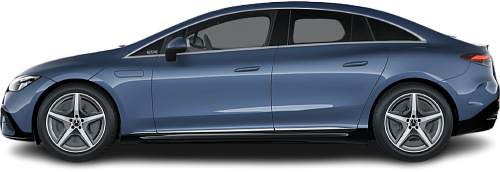Global EV Comparison: Mercedes EQE 350 vs BMW i5 eDrive40
Struggling to Decide? Let AI Help!
Your AI Summary Is Ready!
General Info
Since both vehicles have been discontinued, they are now only available on the used car market. You can get the Mercedes EQE 350 (2022-2023) for as low as €45880, while the BMW i5 eDrive40 (2023-2025) begins at €54889.
The two vehicles share the same body style: Sedan.
| Property | Mercedes EQE 350 | BMW i5 eDrive40 |
|---|---|---|
| Years of Production | 2022-2023 | 2023-2025 |
| Current Status | Discontinued | Discontinued |
| Country of Manufacture | Germany, China | Germany, China |
| Body Style | Sedan | Sedan |
| Market Availability | EU | EU, USA |
| Price Europe (Used) | €45880 | €54889 |
| GCC Score | 6.6 | 6.6 |
Range and Efficiency
While the Mercedes EQE 350 (2022-2023) offers a longer real-world range and a bigger battery, it is less energy-efficient than the BMW i5 eDrive40 (2023-2025).
| Property | Mercedes EQE 350 | BMW i5 eDrive40 |
|---|---|---|
| Range (EPA) | - Range (EPA) | 475 km |
| Range (WLTP) | 621 km | 582 km |
| Range (GCC) | 503 km | 464 km |
| Battery Capacity (Nominal) | 98 kWh | 84.4 kWh |
| Battery Capacity (Usable) | 89 kWh | 81.2 kWh |
| Efficiency per 100 km | 17.7 kWh/100 km | 17.5 kWh/100 km |
| Efficiency per kWh | 5.65 km/kWh | 5.71 km/kWh |
| Range and Efficiency Score | 8.2 | 7.7 |
Charging
Both vehicles utilize a standard 400-volt architecture.
The BMW i5 eDrive40 (2023-2025) offers faster charging speeds at DC stations, reaching up to 206 kW, while the Mercedes EQE 350 (2022-2023) maxes out at 170 kW.
Both vehicles are equipped with the same on-board charger, supporting a maximum AC charging power of 11 kW.
| Property | Mercedes EQE 350 | BMW i5 eDrive40 |
|---|---|---|
| Max Charging Power (AC) | 11 kW | 11 kW |
| Max Charging Power (DC) | 170 kW | 206 kW |
| Architecture | 400 V | 400 V |
| Charge Port | CCS Type 2 | CCS Type 2 |
| Charging Score | 6.5 | 6.9 |
Performance
Both vehicles are rear-wheel drive.
The BMW i5 eDrive40 (2023-2025) boasts greater motor power and accelerates faster from 0 to 100 km/h.
| Property | Mercedes EQE 350 | BMW i5 eDrive40 |
|---|---|---|
| Drive Type | RWD | RWD |
| Motor Type | PMSM | PMSM |
| Motor Power (kW) | 215 kW | 250 kW |
| Motor Power (hp) | 288 hp | 335 hp |
| Motor Torque | 565 Nm | 430 Nm |
| 0-100 km/h | 6.4 s | 6 s |
| Top Speed | 210 km/h | 193 km/h |
| Performance Score | 5.1 | 4.8 |
Dimensions
The BMW i5 eDrive40 (2023-2025) is longer, but has a similar width and height to the Mercedes EQE 350 (2022-2023).
The Mercedes EQE 350 (2022-2023) boasts a more extended wheelbase.
| Property | Mercedes EQE 350 | BMW i5 eDrive40 |
|---|---|---|
| Length | 4946 mm | 5060 mm |
| Width (with Mirrors) | 2103 mm | 2156 mm |
| Width (w/o Mirrors) | 1906 mm | 1900 mm |
| Height | 1503 mm | 1515 mm |
| Wheelbase | 3120 mm | 2995 mm |
Cargo and Towing
The BMW i5 eDrive40 (2023-2025) features a larger trunk, but the Mercedes EQE 350 (2022-2023) offers greater maximum cargo capacity when the rear seats are folded.
Neither car is equipped with a frunk (front trunk).
The BMW i5 eDrive40 (2023-2025) is better suited for heavy loads, offering a greater towing capacity than the Mercedes EQE 350 (2022-2023).
| Property | Mercedes EQE 350 | BMW i5 eDrive40 |
|---|---|---|
| Number of Seats | 5 | 5 |
| Curb Weight | 2405 kg | 2205 kg |
| Cargo Volume (Trunk) | 430 l | 490 l |
| Cargo Volume (Max) | 895 l | 785 l |
| Cargo Volume (Frunk) | - Cargo Volume (Frunk) | - Cargo Volume (Frunk) |
| Towing Capacity | 750 kg | 1500 kg |
| Cargo and Towing Score | 5.5 | 5.8 |




